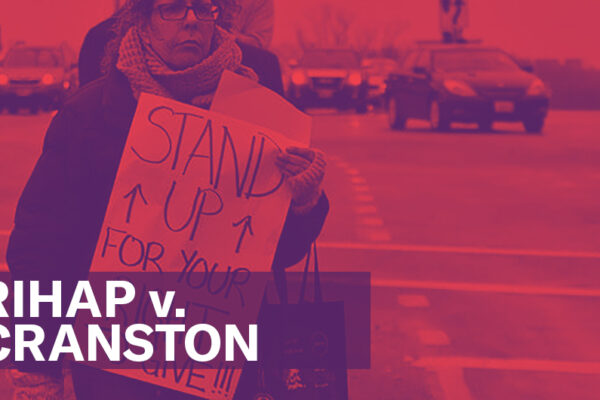In an important preliminary victory for First Amendment rights, U.S. District Court Chief Judge William Smith this morning issued a temporary restraining order against enforcement of the City of Cranston’s anti-panhandling ordinance. The order will remain in effect pending a future trial on the ACLU of Rhode Island’s challenge to the controversial ordinance. In issuing the order, the judge found that the ACLU had demonstrated an ultimate likelihood of success in its legal challenge.
The ordinance bars any person from entering a roadway “for the purpose of distributing anything to the occupant of any vehicle or for the purpose of receiving anything from the occupant of any vehicle.” The suit, filed by ACLU of RI volunteer attorney Lynette Labinger, argues that the ordinance, enacted in February 2017 by a 5-4 vote of the City Council, violates the First Amendment right of individuals to solicit donations and to distribute literature on Cranston roadways.
In April 2016, the ACLU favorably settled a lawsuit against Cranston over a similar ordinance. In that settlement, the City acknowledged that the ordinance violated the First Amendment and halted its enforcement. The current ordinance makes several cosmetic revisions to the original in an attempt – unsuccessfully, the ACLU lawsuit argues – to pass constitutional muster.
“The courts have found that similar ordinances violate the First Amendment, and today’s ruling suggests that this ordinance is no different,” said Steven Brown, ACLU of RI executive director. “It’s unfortunate that municipalities – Cranston in particular – continue to spend valuable tax dollars on efforts that undermine our constitutionally-protected rights and make the lives of the poor more difficult,” Brown continued.
Plaintiffs in the suit are the Rhode Island Homeless Advocacy Project; two Cranston residents – Karen Rosenberg and Deborah Flitman – who are members of the Cranston Action Network and would like to engage in leafleting from traffic islands, but are barred from doing so under the ordinance; and Francis White, Jr., a disabled and formerly homeless resident of Providence, who often has insufficient income to last to the end of the month and relies upon panhandling for additional support.
Although City officials claim the ordinance was adopted as a “public safety” measure, and cited the number of car accidents at various city intersections, Judge Smith found that, “[s]imply put, the [ordinance's] legislative findings are long on conclusory observation but short on meaningful data connecting the chosen solution to an actual problem. Further, Defendants also have failed to explain how activities not prohibited by the Ordinance (hand-to-hand exchanges with individuals on sidewalks or large groups of people yelling with signs on a traffic median, for example) are somehow less distracting than the activities prohibited.
“The Court finds that the public has a significant interest in local policies that do not infringe individual First Amendment rights, and will not be harmed by the issuance of this temporary restraining order pending a final determination about whether the Ordinance is, in fact, a violation of the First Amendment,” Judge Smith continued in his ruling.
Full text of the TRO can be found here.
More information about the lawsuit, RIHAP v. Cranston, can be found here.

